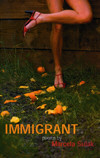Immigrant
The cover of Immigrant reveals the high heels and provocative bare legs of a woman peeling and eating oranges, and indeed the book depicts sexual relationships, but there are also fruits, domestic and exotic, countries of partisans, barbed wire fencing in Texas, layered speech, a clear-eyed love of the world, and dreams, too, of what’s missing. These poems, with exact, evocative lines and phrases, summon, re-awaken, evoke, as in the Latin vocare, to call, call forth. Then they shape, skillfully, the call, the voice, the song, the busses that “splash the same / sloppy syllable across each sidewalk” or “the hieroglyphs that suckle”; they move “like a tongue / through the mouths of the speechless.”
The cover of Immigrant reveals the high heels and provocative bare legs of a woman peeling and eating oranges, and indeed the book depicts sexual relationships, but there are also fruits, domestic and exotic, countries of partisans, barbed wire fencing in Texas, layered speech, a clear-eyed love of the world, and dreams, too, of what’s missing. These poems, with exact, evocative lines and phrases, summon, re-awaken, evoke, as in the Latin vocare, to call, call forth. Then they shape, skillfully, the call, the voice, the song, the busses that “splash the same / sloppy syllable across each sidewalk” or “the hieroglyphs that suckle”; they move “like a tongue / through the mouths of the speechless.”
They live, move, and have their being mainly through fruits, and an occasional vegetable, one variety of which made its way to Brussels, where “Gentlemen and lean / courtesans took into their mouths its tight / green jackets, endlessly disrobing.” There are histories of, yes, “Brussels Sprouts,” as well as of dates and radishes, histories specific, down-to-earth – the date “often yields the fibers of her trees / for baskets, shoes, the rope and needle, thread” – but also associative. Lifting radishes to the sink, the poet recalls “how Egyptian women dyed / their nipples scarlet in a braver night.”
The majority of the 40 or so poems in this book refer directly or indirectly to fruit, so Marcela Sulak risks, on the one hand, being a show-off – look how many oranges, dates, and Brussels sprouts I can juggle – and on the other, wearing out the reader’s appetitive welcome. This reader, however, savored almost all these poems for their pungency, variety, and strength. About half of them focus, joyfully, wisely, ruefully, on love requited and unrequited, love both sensual and metaphysical, juicy love and drying-up love. The speaker addresses “raggy cabbage,” perhaps a lover, as “so unseemly chaste / so haughty in your modesty, so moderately good.” Lust “is a pocketknife too small for the task at hand.” Often the speaker tries to find another language for love, for experience – Section 1 of her 2-part book is called “The Mouths of the Speechless.”
Just as fruits and vegetables become not only themselves but launching pads for metaphor and association, so does the “Immigration” theme. Sulak has translated books from French and Czech and lived and worked in at least five countries. She has a deeply nuanced view of what immigration really is and means, a take that’s light years more humane and sophisticated than that of our current U.S. political discourse on this subject. At a Catholic school in Germany, the lovely Beatriz welcomes the poet/speaker, “a foreigner who has no key.” As several daughters escape from a difficult home life, they reduce “the sum of chaos by a suitcase” when they leave. An immigrant in, apparently, Texas, says, “It is not our home / though we don’t remember any other.” Without in any way propagandizing, these poems make a powerful case for empathy, for our human commonalities.
Despite its relatively small number of poems, this is an unusually capacious volume. Sulak not only knows food, and much about love and immigration, but her larger vision includes myth, history, the power of geography to shape destiny, the ceaseless movements, exterior and interior, of humanity, the boundaries and mysteries of words. She thinks by feeling, to paraphrase Theodore Roethke, thinks big, and observes senses, feels her way into thought, all with formal control and lively, precise language. Pick these poems, and savor each, one by one.





